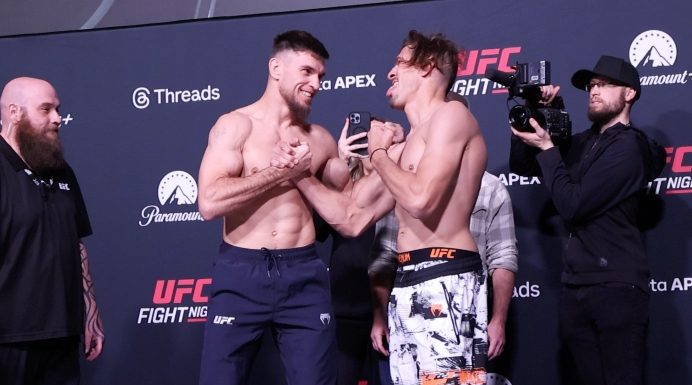Las Vegas, NV — Josiah Harrell’s exit from the UFC 290 card this week was addressed by UFC President Dana White following Friday night’s Power Slap event in Las Vegas.
Harrell was pulled from a short-notice fight with Jack Della Maddalena after his pre-fight MRI detected an abnormality in his brain. Harrell has now been diagnosed with moyamoya syndrome, the result of blocked arteries at the base of the brain. Coincidentally, that’s the same condition that forced Vince Murdock to put his own fighting career on hold a few years back.
Somewhat shockingly, Harrell also revealed that he had never had a brain scan through seven professional fights. White, however, was not entirely surprised.
“So if you took the 23 years that we’ve been doing this, and you saw how many people we found with problems that probably shouldn’t have been fighting — even kids that we found that wanted to get into The Ultimate Fighter. Yeah, it’s everything. It’s insane that this goes on out there,” White exclaimed, speaking to media outlets including Cageside Press at the UFC Apex.
“These other organizations are regulated. It’s crazy. We spend millions and millions of dollars on health and safety. It is the most important thing that we focus on and that we care about, as far as putting on fights.”
White also knows that when it comes to regional promotions, that sort of money is an obstacle.
“They can’t afford it. They can’t afford it,” he noted. White believes it would be impossible for lower level promoters to do the level of testing required to ensure everyone is safe — not just in MMA but Slapfighting as well. “But knock on wood, a lot of bad things have happened in the sport in the last 23 years, even in the smaller shows. At the end of the day, if you’re involved in a combat sport, and I consider football a combat sport too, there’s a risk. Every time you go out and compete, there’s a risk. What we try to do is minimize the risk as much as possible.”
That, added White, is part of the reason the promotion built the UFC Performance Institute. “We got these athletes in there for weeks, sometimes months, evaluating them, making sure they’re good, making sure they’re training properly, healthy, safe, the list goes on and on.”





















